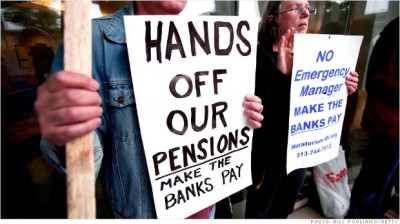Detroit’s Emergency Manager Plans Early Payoff of Top Banks

In a move that illuminates the class character of the Detroit bankruptcy proceedings, the city’s emergency manager, Kevyn Orr, is proposing to pay off two banks before all the rest of the city’s creditors, including retired workers who are owed their pensions.
This week Orr’s legal team is appealing to the bankruptcy court to allow the city to pay at least $250 million to UBS and Bank of America immediately, as part of an agreement to “unwind” a complex interest rate swap agreement. The proposal amounts to a payment of the two banks of between 75 and 82 cents on the dollar, far more than Orr is proposing to pay other obligations.
On Monday, US Bankruptcy Judge Steven Rhodes delayed a hearing on the proposal, with city officials requesting more time. Other wealthy bondholders are upset at the deal because it may mean that they get less money on their own claims.
The $250 million payment is for interest incurred and includes a sizable termination fee for a default-swap loan made in 2006 to enable the maintenance of payments to the pension fund. The deal was pushed by the two banks with the claim that interest rates were almost certain to go up. The city agreed to pay a fixed rate of 6.3 percent, while UBS and Bank of America would pay the difference between the actual market rate interest and the agreed upon fixed rate.
The collapse of the economy in 2008-2009 and the response of the government created the opposite situation: interests plummeted, creating a disaster for the city and a boondoggle for UBS and Bank of America. The city has been saddled with the interest debt at well above market rates, exacerbating the financial crisis and making Detroit more vulnerable to the financial predators who now are assailing it.
The Detroit News cites Robert Brooks, a professor of finance at the University of Alabama in Tuscaloosa, who points out that Detroit is among many cities that made “bad bets” on interest rates. “They bought the story line in ’06 that rates were at an all-time low and they should lock this in with a swap. .. making the bet that rates were going to go up.”
Brooks added, “It’s kind of like gamblers ruin —now that I’m underwater, let’s double down.”
Orr’s office says there is no choice but to terminate the swap arrangement because the two banks control access to $15 million a month in casino tax revenue as part of an agreement made in 2009 to avert a much larger payout.
University of Maryland law school financial derivatives expert Michael Greenberger said, “He gave the banks a big, wet sloppy kiss. Why should the banks get 75 to 82 cents on the dollar, but the Detroit workers get 10 cents on the dollar? Whose life is destroyed by this?”
Unwinding the swap with UBS and the Bank of America entails the payment of huge termination fees demanded by the banks. Patrick O’Keefe, CEO of a Detroit-area financial restructuring firm said, “It makes almost no sense to unwind a swap because whatever you pay in a premium has to get factored into what you’re going [sic] pay.” Because the swap arrangements are tied to the duration of the pension bonds which expire in 2029 and 2034, the banks are free to levy large fees in order to end them.
The complex chain of events leading to the forced bankruptcy of the city all involve the operations of financial institutions plundering the assets of Detroit.
The proposal of Orr’s office has nothing to do with freeing funds for “reinvestment in this city to provide for the health, safety and welfare of the citizens,” as Orr testified last week, but rather to cherry-pick the existing revenues to ensure the profits of the largest creditors.
The proposals of the emergency manager to end retiree health care and slash pensions expose the real intentions of the financial dictatorship imposed on the citizens of Detroit.

